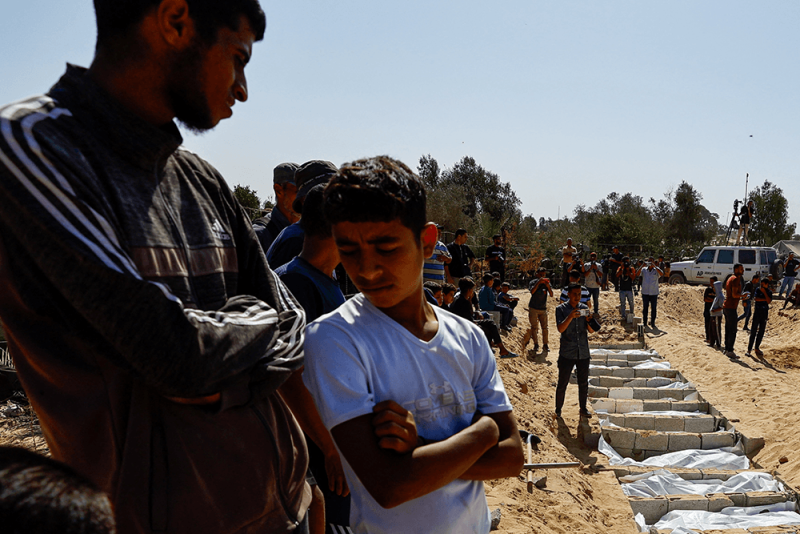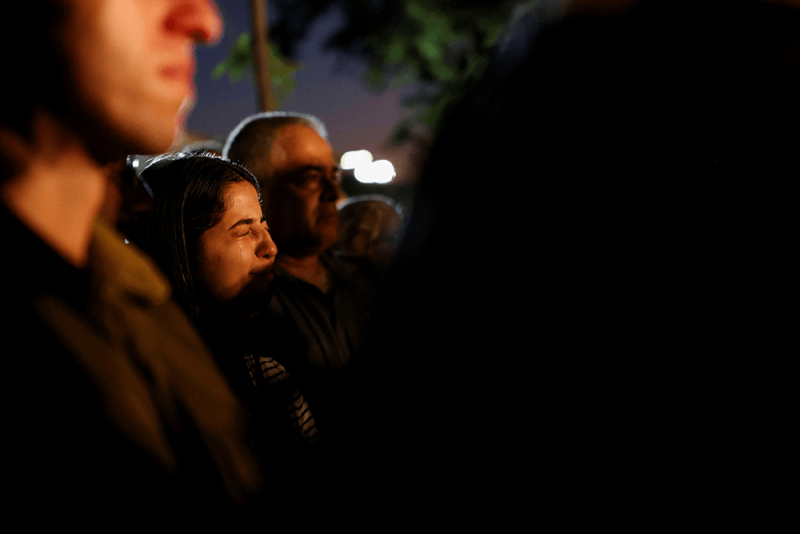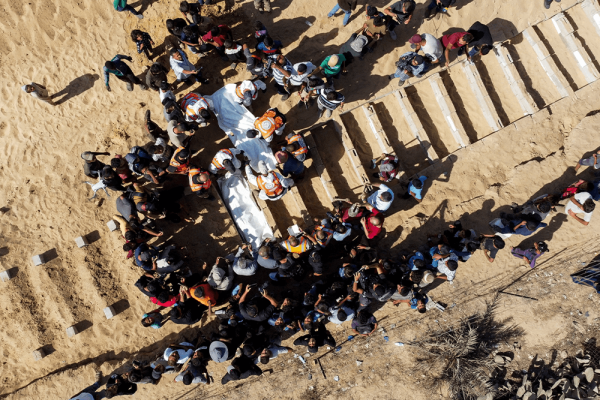Faith leaders working toward peace in Israel and Palestine have met the ongoing ceasefire with wary hope—grateful for a step toward peace, but anxious about long-term justice.
“Our organizational position and a part of the sentiment I’m experiencing is a cautious hope,” said Rev. Mae Elise Cannon, Executive Director of Churches for Middle East Peace. “We’re not using optimism, we’re using hope.”
On Oct. 8, Israel and Hamas agreed to commence the first stage of a 20-point peace plan drawn up by President Donald Trump with the assistance of Middle East allies. The Trump-led plan marks the third cessation in fighting between Israel and Hamas since October 2023, after Hamas’s terrorist attacks on Israel, which killed 1,200 people, and Israel’s following offensive on Gaza which has killed more than 67,000. Israel’s military violence and blockading of aid and food have led to a humanitarian crisis that the UN and other groups have called a genocide.
In accordance with the plan, Israel has released almost 2,000 Palestinian captives; Hamas released 20 living captives and the bodies of 13 deceased captives. But other portions of the plan have not yet been implemented.
READ MORE: As a Palestinian Pastor, I Can’t Call This ‘Peace’ Plan Justice
Hamas has attributed delays in retrieving the remains of the other 21 deceased captives to difficulties navigating Gaza’s destruction. In response, Israel originally only allowed half as many aid trucks as it agreed to. Israel’s military has also conducted two strikes, killing Palestinians. After reports of killings in the Gaza Strip by Hamas fighters, President Trump posted on Oct. 16 that “If Hamas continues to kill people in Gaza, which was not the Deal, we will have no choice but to go in and kill them.” And on Oct. 20, The New York Times reported that the White House was “increasingly concerned” that Israeli Prime Minister Benjamin Netanyahu could soon dismantle the agreement.
For Cannon, this is a reminder that a fully implemented peace plan will have to address more than the release of captives.
“This trajectory towards peace is a great thing, but the two major issues that both Israel and Hamas have not successfully negotiated are the timing of Israeli troops leaving Gaza and the disarmament of Hamas,” she said.
Long term liberation
Peace activists are also concerned that the plan will not lead to a free and secure future for Palestinians. None of the points of the peace plan affirm Palestinian statehood. While the majority of the UN member nations acknowledge a Palestinian state, the notion is referred to as an “aspiration of the Palestinian people” in the proposal.
“We will certainly celebrate if the hostages are released in addition to the release of thousands of Palestinians held in detention,” Cannon said. “But the main things we’re calling for are that the core causes of the conflict, including the decades-long occupation of the Palestinian people, be brought to an end. Our work won’t change much until those specific things are implemented.”
Greg Khalil, president and co-founder of Telos Group, an organization that trains and equips peacemakers across the U.S., echoed those sentiments.
“This feels exactly like what I’ve been through many times before,” Khalil, who has family in the Palestinian town of Beit Sahour and worked on Israeli disengagement from Gaza in 2005, said. “The actual plan isn’t talking about delivering peace … it envisions Israeli permanent control over Gaza.
“So here again, I have this fear that while today is a moment of celebration, many of the forces who brought us here still want to take us further down this road of supremacy and oppression,” he said.
251023-PeacePlan2.png

The closest thing in the Trump peace plan to a self-governing body involves an “apolitical Palestinian committee” overseen by a board of officials, including Trump and Tony Blair, the former prime minister of Britain and an architect of the Iraq War.
Blair and Trump’s proposals follow the same general throughline of denying Palestinians the right to self-determination, suppressing the potential for resistance through mass demilitarization initiatives, and framing the razed and devastated Gaza as a real estate venture. Trump referred to Gaza as a “big real estate site” in February. Similarly, Israeli Finance Minister Bezalel Smotrich described Gaza as a “real estate bonanza” in September.
Thus, for many who are concerned with Palestinian liberation, the plan feels less like an effort for peace and more like the continuation of Israeli occupation of Gaza.
Jonathan Kuttab, who is the co-founder of Palestinian human rights group Al-Haq and an international human rights lawyer practicing in Palestine and Israel, said that the deal fails to provide any assurances for a path forward.
“The one aspect which was nailed down was the exchange of prisoners, but other than that it was very, very loose on detail,” Kuttab said.
Kuttab said the deal primarily favors Israel while refusing to provide any freedoms and protections for people in Gaza.
“This is definitely a cessation of the genocide, at least for the time, but people are still being killed, people are still being restricted from movement,” he said. “[Israel] now seems to have the green light to move when and as it wants to, and to determine for itself what should or should not be allowed.”
Rev. Jeff Wright, who has led alternative tours to Israel and Palestine and served as a short-term missionary in the region, said the plan shouldn’t be seen as an agreement between two equal warring powers.
“When it comes to the agreement, I don’t see it as an agreement between two warring sides,” he said. “It’s really an agreement that’s been imposed by the occupier and its supporters—namely the U.S.—upon the occupied.”
The continuing crisis of Christian Zionism
In the U.S., support for Israel is buoyed by Christians, especially evangelicals. A 2024 report from The Chicago Council on Global Affairs found that 64% of white evangelicals support Israel’s actions in Gaza and that 35% believe that the U.S. is not aiding Israel enough. Wright, who first toured Jerusalem and Bethlehem in 1986, said too many Christian theologies in the U.S. are complicit in manufacturing consent for the genocide of Palestinians.
“I am deeply concerned about the impact of Christian Zionism, which is married to Christian nationalism in our country, and the excitement that Christian Zionists have had when Israel is doing its bombing and starvation policy,” Wright said.
Kuttab said that “Christian Zionism is very broadly present amongst the Christian churches, particularly evangelicals, but it’s very shallow,” he said.
Chief operating officer of Telos, Dave Davis, additionally expressed his fear of further Christian indifference to Palestinian suffering in the face of this deal.
“We have been here before. This is not about mutual flourishing, this is not about mutual dignity, and I would want [Christians’] hearts to continue to be broken,” Davis said.
Telos, which does the majority of its work in the U.S., is not a faith-based organization but does do work in faith-based spaces. Khalil, and Davis, a former pastor, have both witnessed how the conversations of the Israeli occupation and genocide of Palestinians have been received by U.S. Christians.
“Israel/Palestine is not a conflict thousands of miles away,” Khalil said. “We’ve imported it into our churches, our houses of worship, and our politics.”
251023-PeacePlan3.png

In the evangelical church, Davis has observed a stubbornness on behalf of faith leaders. The topic, which he describes as being a “very divisive, [and] a very defensive conversation,” is still quite difficult to broach within church life. Khalil attested to the relative ignorance of American Christians in acknowledging that Palestinian Christians exist and are also being victimized by Israel.
“So many people don’t recognize that Jesus was born in Bethlehem,” he said. “Or believe that Israel, a modern nation state, is the same as Israel in the Bible.”
Given the nature of Christian Zionism in the U.S., Wright and Kuttab both said Christians who support peace in Israel/Palestine and Palestinian rights have a special responsibility to be vocal.
“I think the important thing is that Christians do have a duty to have a position toward the genocide,” Kuttab said. “But that duty should be Christ-centered. It should be based on the message of Christ, which is a message of love, reconciliation, peace, and equality.”
Wright expressed the need for Christians to be on the frontlines of protest.
“Palestinian supporters—Jewish, Muslim, Christian folks of goodwill—are mystified that there aren’t more church leaders and pastors out on the street,” Wright said. “They should be the ones leading us on the streets, but we don’t hear their voices.”
“Israel/Palestine is not a conflict thousands of miles away,” Khalil said. “We’ve imported it into our churches, our houses of worship, and our politics.”
Got something to say about what you're reading? We value your feedback!





